Social Protection
Context
The State of the World’s Cash 2020 report found:
- Working with, through and alongside social protection systems is now considered key to strengthening the humanitarian-development nexus and humanitarians are increasingly active in this space
- Practitioners find that the three biggest challenges to effective linkages are: (i) lack of coordination between the actors involved, (ii) social protection systems are not designed to respond to crises, (iii) humanitarian practitioners lack expertise in social protection
- Critically, there is no ‘one size fits all’ solution to linking CVA and social protection. Trade-offs between efficiency, effectiveness, accountability, and sustainability must be considered to ensure the best outcomes for people living in crisis and depends on context, existing systems, and timeframe. Linking will not always be appropriate and social protection systems may not meet all needs. In many contexts, in the short to medium term at least, humanitarian programming will be required to fill gaps.
Current Priorities
The CALP Network has invested intensely in this thematic area over the last few years. We will continue to work closely with the SPIAC-B Working group on linking humanitarian (cash) assistance and social protection (formerly the Grand Bargain Sub-Workstream on Social Protection) and with the SocialProtection.org platform and the Online Community Social Protection in Crisis Contexts to develop evidence, produce capacity building materials and provide technical support to coordination actors.
Community of Practice
SocialProtection.org hosts a dynamic and collaborative online community of practice (CoP) bringing together individuals from diverse backgrounds interested in expanding social protection in crisis-prone areas. The CoP offers a space to exchange documents, insights, and news in order to progress and learn together. Its inclusive and member-led approach offers organisations and individual members a forum to increase learning and outreach, facilitating the exchange of experiences and expanding knowledge. A discussion group hosted by dgroups.org complements these activities by connecting users rapidly via email.
SPACE
There are a wealth of relevant resources from ‘Social Protection Approaches To Covid-19: Expert Advice’ (SPACE) published in the CALP library.
Featured content

Linking Social Protection and Humanitarian Cash and Voucher Assistance
Report
There is a growing momentum and body of work around the idea of developing stronger links between humanitarian cash and voucher assistance (CVA) and social protection (SP). This Briefing Paper for the CALP Network, based on a literature review, a survey, and interviews, is intended to inform the CALP Network’s overall approach in this area, and subsequently its capacity building and...

Linking Social Protection and Humanitarian Cash
Blog Post
The case for social protection to help people cope with shocks has always been clear and never more obvious than during the current Covid-19 crisis. These issues are currently playing out in real time as governments, donors and aid agencies scramble to find ways to get more help to more people to cope with the economic consequences of illness and lockdown. As the virus starts to take hold in...

Linking Social Protection and humanitarian cash and voucher assistance (CVA) – what do we really know and where to start? Findings from the CALP Network commissioned high level briefing paper at the time of COVID-19
Webinar
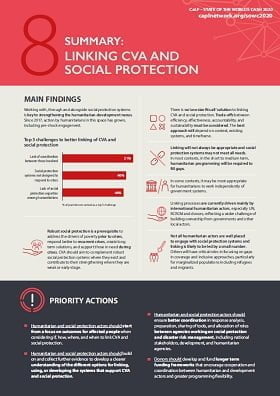
State of the World’s Cash 2020 Chapter 8 summary: Linking CVA and social protection
Report
Longstanding efforts to strengthen links between humanitarian CVA and social protection have been accelerated by the COVID-19 pandemic, with significant progress since the last report. CVA should aim to complement robust social protection systems where they exist and contribute to their strengthening where they are weak or early-stage. This chapter asks: ‘What opportunities and challenges...
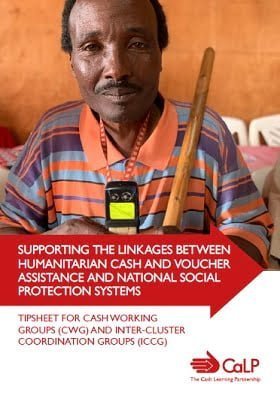
Supporting the Linkages Between Humanitarian Cash and Voucher Assistance and National Social Protection Systems
Report
This tipsheet aims to support country-level coordination efforts to strengthen the engagement between humanitarian coordination groups that implement cash and voucher assistance (CVA) and existing social
protection or disaster risk reduction coordination actors and groups. In particular, it seeks to offers inter-cluster and cash working group coordinators simple practical tips for engaging...
Case Studies

Linking CVA and Social Protection in the MENA Region – Crib sheet
Report
Building linkages between humanitarian cash and voucher assistance (CVA) and social protection (SP) has become an increasingly prominent topic over the past five years and the Middle East and North Africa (MENA) region has been at the centre of this evolution. The objective of this resource set (the crib sheet and 3, soon to be 6, regional case studies) is to ensure that the CALP Network...
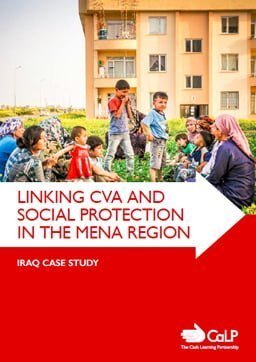
Linking CVA and Social Protection in the MENA Region – Iraq Case Study
Report
Building linkages between humanitarian cash and voucher assistance (CVA) and social protection (SP) has become an increasingly prominent topic over the past five years and the Middle East and North Africa (MENA) region has been at the centre of this evolution. The objective of this resource set (the crib sheet and 3, soon to be 6, regional case studies) is to ensure that the CALP Network...

Linking CVA and Social Protection in the MENA Region – Lebanon Case Study
Report
Building linkages between humanitarian cash and voucher assistance (CVA) and social protection (SP) has become an increasingly prominent topic over the past five years and the Middle East and North Africa (MENA) region has been at the centre of this evolution. The objective of this resource set (the crib sheet and 3, soon to be 6, regional case studies) is to ensure that the CALP Network...
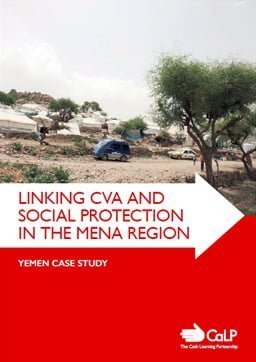
Linking CVA and Social Protection in the MENA Region – Yemen Case Study
Case Study
Building linkages between humanitarian cash and voucher assistance (CVA) and social protection (SP) has become an increasingly prominent topic over the past five years and the Middle East and North Africa (MENA) region has been at the centre of this evolution. The objective of this resource set (the crib sheet and 3, soon to be 6, regional case studies) is to ensure that the CALP Network...

Linking Cash and Voucher Assistance (CVA) and Social Protection – Occupied Palestinian Territories (OPT): Country Summary
Report
This country summary is part of a larger resource set, providing practitioners with examples of different approaches to linking CVA
and social protection.
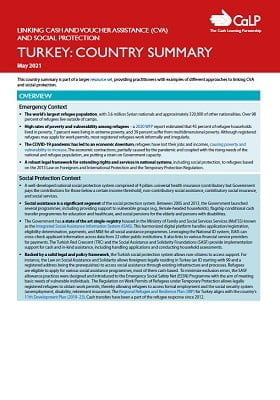
Linking Cash and Voucher Assistance (CVA) and Social Protection – Turkey: Country Summary
Report
This country summary is part of a larger resource set, providing practitioners with examples of different approaches to linking CVA
and social protection.
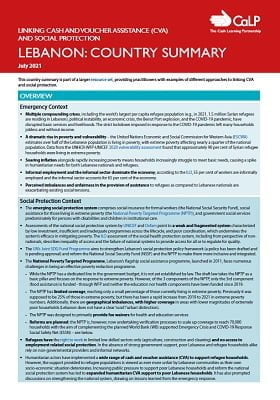
Linking Cash and Voucher Assistance (CVA) and Social Protection – Lebanon: Country Summary
Report
This country summary is part of a larger resource set, providing practitioners with examples of different approaches to linking CVA
and social protection.
Thematic lead
Latest

The Public Pursuit of Secure Welfare: Background Paper on International Development Institutions, Social Protection & Developing Countries
Report
This paper provides an overview of the development of the conceptual framework underlying social protection programming and policy among the key international development institutions active in this sector. It sets out the historical, institutional and political factors underlying the current debate,...
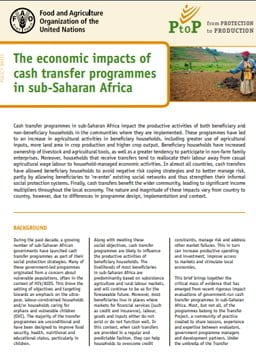
The Economic Impacts of Cash Transfer Programmes in Sub-Saharan Africa
Report
This brief brings together the critical mass of evidence that has emerged from recent rigorous impact evaluations of government-run cash transfer programmes in sub-Saharan Africa. Most, but not all, of the programmes belong to the Transfer Project, a community of practice created to share lessons,...

Cash Transfers and Resilience: Strengthening Linkages Between Emergency Cash Transfers and National Social Transfer Programmes in the Sahel – Discussion Paper
Report
This discussion paper has been inspired by the exchanges that took place during the course of the learning event. It seeks to extend the discussion to include other actors working within the region, as well as in other regions confronted with the same questions. It proposes an initial approach to the...
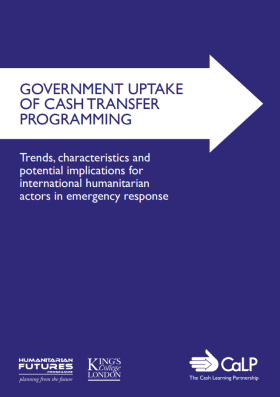
Government Uptake of Cash Transfer Programming: Trends, characteristics and potential implications for international humanitarian actors in emergency response
Policy paper
Trends, characteristics and potential implications for international humanitarian actors in emergency response. This thematic report has been undertaken as part of a 2013 research study entitled, Is Cash Transfer Programming ‘Fit for the Future’? The research was commissioned by the the CALP...

The EU and Social Protection in Africa
Report
The European Report on Development recommends that the EU should make social protection an integral and central component of its development policy. But what can the EU bring to the social protection agenda of African and other developing countries?

Surveying Livelihoods Service Delivery and Governance: Baseline evidence from Nepal
Report
In 2012/13, SLRC implemented the first round of an original cross-country panel survey in Nepal designed to produce information on: people’s livelihoods (income-generating activities, asset portfolios, food security, constraining and enabling factors within the broader institutional and geographical...

Factors Affecting the Cost-efficiency of Electronic Transfers in Humanitarian Programmes
Report
Led by Oxford Policy Management (OPM) with support from Concern Worldwide, this research aims to answer the key question: Are electronic transfers more cost-efficient than traditional manual based cash delivery methods, and under what conditions? Cash is increasingly offered to households in...
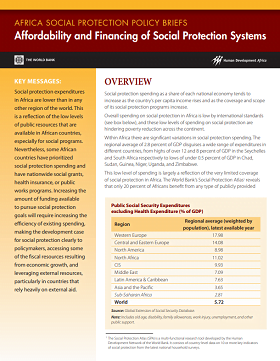
Africa Social Protection Policy Briefs – Affordability and Financing of Social Protection Systems
Report
Social protection spending as a share of each national economy tends to increase as the country’s per capita income rises and as the coverage and scope of its social protection programs increase. Overall spending on social protection in Africa is low by international standards (see box below), and these...

Social transfers in the fight against hunger – A resource for development practitioners
Report
A European Commission Reference Document aims to deepen the understanding of a concept, develop knowledge, provide orientations for aid implementation, and present good practices. This Reference Document is intended as a resource to support the practical integration of social transfers into programmes...
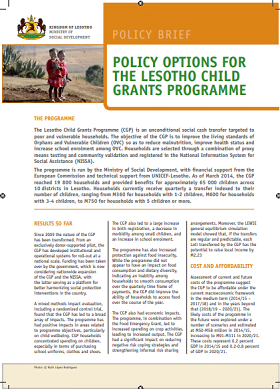
Policy brief – Policy options for the Lesotho Child Grants Programme
Policy paper
The Lesotho Child Grants Programme (CGP) is an unconditional social cash transfer targeted to poor and vulnerable households. The objective of the CGP is to improve the living standards of Orphans and Vulnerable Children (OVC) so as to reduce malnutrition, improve health status and increase school...

Social Transfer Programme in Nepal: An overview
Presentation
A overview of the social transfer programme in Nepal.
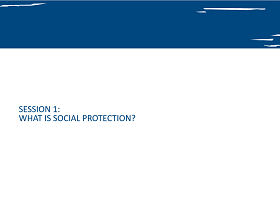
What is social protection?
Report
This presentation was made on behalf of UNICEF at the social protection framework validation meeting that took place at the Jacaranda Hotel in Nairobi, Kenya on 26 September 2014. It looks at components and dimensions of social protection, lessons from global experiences and some limitations of the...

Market Analysis for Preparedness and Development: Piloting Innovation in Guatemala
Report
This case study charts the process, successes and learning from Oxfam’s pilot joint market analysis in Guatemala 2013. One of the key lessons is that, despite the initial reluctance to market based programming approaches, a critical impact of the assessment has been increased interest from other...
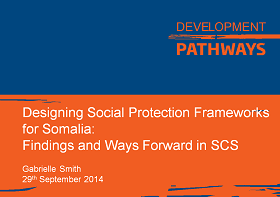
Designing Social Protection Frameworks for Somalia: Findings and Ways Forward in SCS
Report
This presentation was made on behalf of Development Pathways at the social protection framework validation meeting that took place at the Jacaranda Hotel in Nairobi, Kenya on 26 September 2014. It looks at designing social protection frameworks for Somalia and covers: 1.Activities and Methods 2.Macro...
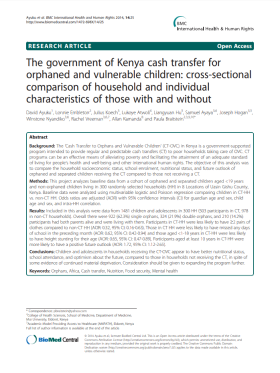
The Government of Kenya Cash Transfer for Orphaned and Vulnerable Children: Cross-sectional Comparison of Household and Individual Characteristics of Those With and Without
Report
The ‘Cash Transfer to Orphans and Vulnerable Children’ (CT-OVC) in Kenya is a government-supported program intended to provide regular and predictable cash transfers (CT) to poor households taking care of OVC. CT programs can be an effective means of alleviating poverty and facilitating the attainment...

Guidance for DFID country offices on measuring and maximising value for money in cash transfer programmes
Guidelines and Tools
This document is a revised edition of Guidance for DFID country offices on measuring and maximising value for money in cash transfer programmes which DFID published in October 2011.
The guidance is in two linked parts:
1. Part 1 provides a toolkit which sets out key concepts and metrics for analysing...
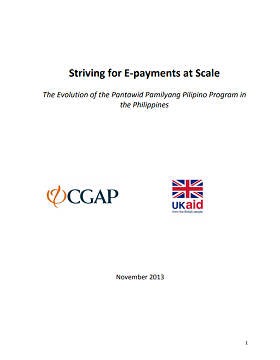
Striving for E-Payments at Scale in the Philippines
Report
As the Philippines experienced economic growth in the early 2000s, it still saw a rise in poverty. The Pantawid Pamilyang Pilipino Program (4Ps) is a conditional cash transfer program that aims to provide short-term poverty alleviation for poor households. The program emerged out of the country’s...

E-Payments in Uganda with Limited Infrastructure
Report
The 2005 Uganda Chronic Poverty Report argued that households in chronic poverty show a range of deficits that include deficient consumption and malnutrition, limited access to health and education, and limited voice and influence. For many of these households social exclusion reinforces their...

Social Acceptability and Perceived Impact of a Community-Led Cash Transfer Programme in Zimbabwe
Report
Cash transfer programmes are increasingly recognised as promising and scalable interventions that can promote the health and development of children in poor resource and high HIV prevalence areas of sub-Saharan Africa. However, concerns have been raised about the potential for cash transfer programmes to...

Building Orphan Competent Communities: Experiences from a community-based capital cash transfer initiative in Kenya
Report
As a result of the increasing number of orphans in sub-Saharan Africa, numerous programmes have been initiated to facilitate the care and support of orphaned and vulnerable children. This paper reports on a community-based capital cash transfer initiative in Kenya and explores its role in building orphan...

